While researching various homeschooling methods or curriculum options, you’ve probably come across the term ‘Unit Studies’. But, what is this approach, and can you use it in your family? We’ll look at these questions in this article, plus I’ll run you through some of the most popular unit studies curriculum packages available today.

I hope you enjoy reading this blog post. If you want to do my course on how to homeschool, click here.
At the end of the page, there’s also a video on Unit Studies (US). Don’t forget to subscribe to the How to Homeschool channel for more information on homeschool methods.
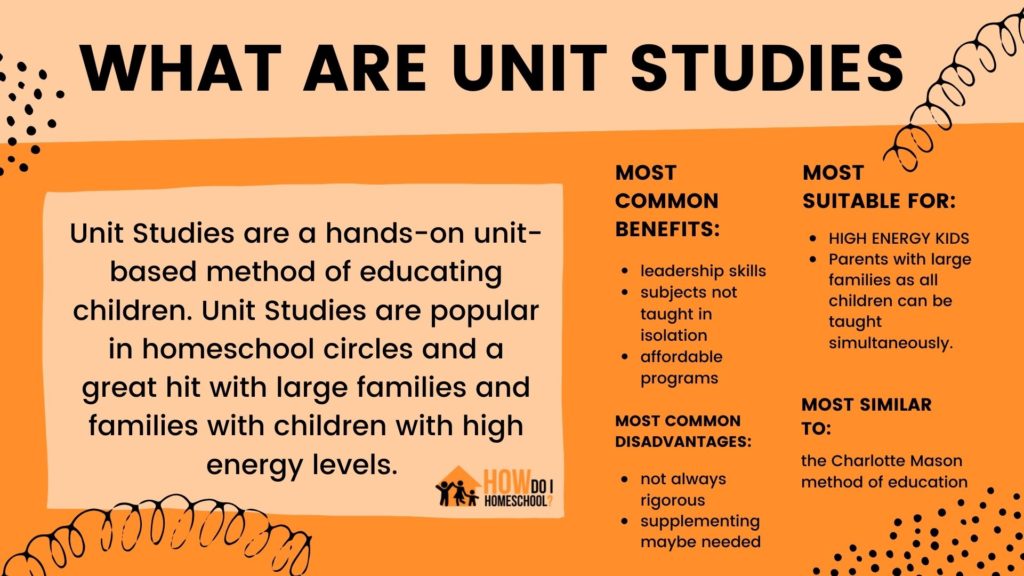 Some of the links in this post are affiliate links.
Some of the links in this post are affiliate links.What are Unit Studies?
Unit studies are collections of hands-on learning activities tied to a theme. Children can learn the main subject areas like Math, English, and Science through a hands-on approach.
This brings these subject areas to life to make learning fun and exciting. The benefits of Unit Studies are that you can accommodate your children’s interests effectively and teach your whole family as they learn about the subject together.
Many people use lapbooking (getting children to create mini-books on the subject) to help learn the content in Unit Studies. This helps reduce ‘information spoon-feeding’ as is often seen in public schools) and is fun and helps children become more self-motivated and self-directed.
Is This the Best Way to Homeschool?
Many people choose the Unit Studies method after trying the traditional (school-at-home) approach. Many parents have found the traditional system was too rigid, and children (especially high-energy children) struggled to sit down and do the work.
The unit studies approach is the best way to homeschool for many parents. It allows parents to teach the whole family simultaneously to engage their entire body and, therefore, helps with the fidgets!
Let’s look at more of the benefits of US below.
The Benefits of Unit Studies Homeschooling Method
If you have a large family you want to homeschool, the Unit Studies method promises to give your whole family a fun education. It offers several benefits, which include:
- Being able to teach your whole family at the same time.
- The ability to engage your children as they learn through hands-on activities.
- Older siblings can teach younger siblings, making them masters of the subject.
- Greater bonding between the family as they work together to accomplish the lesson.
- Creating great leaders of older siblings as they take charge of the younger ones.
- Less stress as Mom or Dad doesn’t have to run between siblings who are all doing different lessons at different times.
As you can see, the US method can effectively join a family together, giving them the same vision. It can also help your day run smoothly as you have fun learning together.
Examples of Unit Studies
The US method involves making a series of activities that correspond with an overarching theme. If you were teaching your children about the following:
- plagues of Egypt, your children might learn about Pharaohs in History, frogs in Science, and Egyptian topography in Geography.
- weather, you might discuss how rain forms in Science, drought or flood events in History, and volcanos in Geography.
- electricity, you could discuss when electricity was invented in History, how it was invented in Science, and so on.
You can apply the US approach to an endless amount of topics. With Unit Studies Made Easy by Bendt Family Ministries, you can even create your own Unit Studies Made Easy by Bendt Family Ministries.
Pros and Cons of this Method
Unit studies are a popular homeschooling method, but they aren’t for everyone. Before deciding on using them in your homeschool, consider the pros and cons.
On the plus side, US allow you to cover many different subjects in a short amount of time. They can be especially helpful if you have a child interested in a topic and wants to learn more about it. Unit studies also help children learn how to think critically and research topics independently.
However, there are some potential downsides to using US. First, they can be time-consuming to put together. You need to find materials that cover the topic you’re studying and then find ways to tie them all together (although you can do this with a well-thought-out curriculum – see below for more on this). Second, unit studies can be challenging for children struggling with a particular subject.
Finally, US can miss certain subjects, so they often need to be supplemented, which some parents see as a considerable disadvantage.
Unit Studies vs Other Homeschool Methods
Compared to other homeschool methods, unit studies are more hands-on and integrate more subjects into one unit than any other method.
Other methods focus more on children listening to the material and engaging with it, but US allow students to get crafty and explore things with their hands.
Charlotte Mason’s approach is most similar to the unit studies method out of all the methods.
Conversely, the classical and traditional methods would be most different from the US approach.
Lately, many eclectic homeschool curriculum programs have arisen which combine the Unit Studies method with other approaches. For example, My Father’s World combines Charlotte Mason, classical, and US to form a cohesive curriculum.
Why You Should Start a Unit Study with Your Child Today
Unit studies are a great way to get your child interested in learning. They allow for a more hands-on approach to education, which can be fun and engaging for kids.
Unit studies also allow you to focus on a specific topic in-depth, which can help your child learn more about the subject. Finally, US can be done with any age group, so there’s no need to wait until your child is older to start using them.
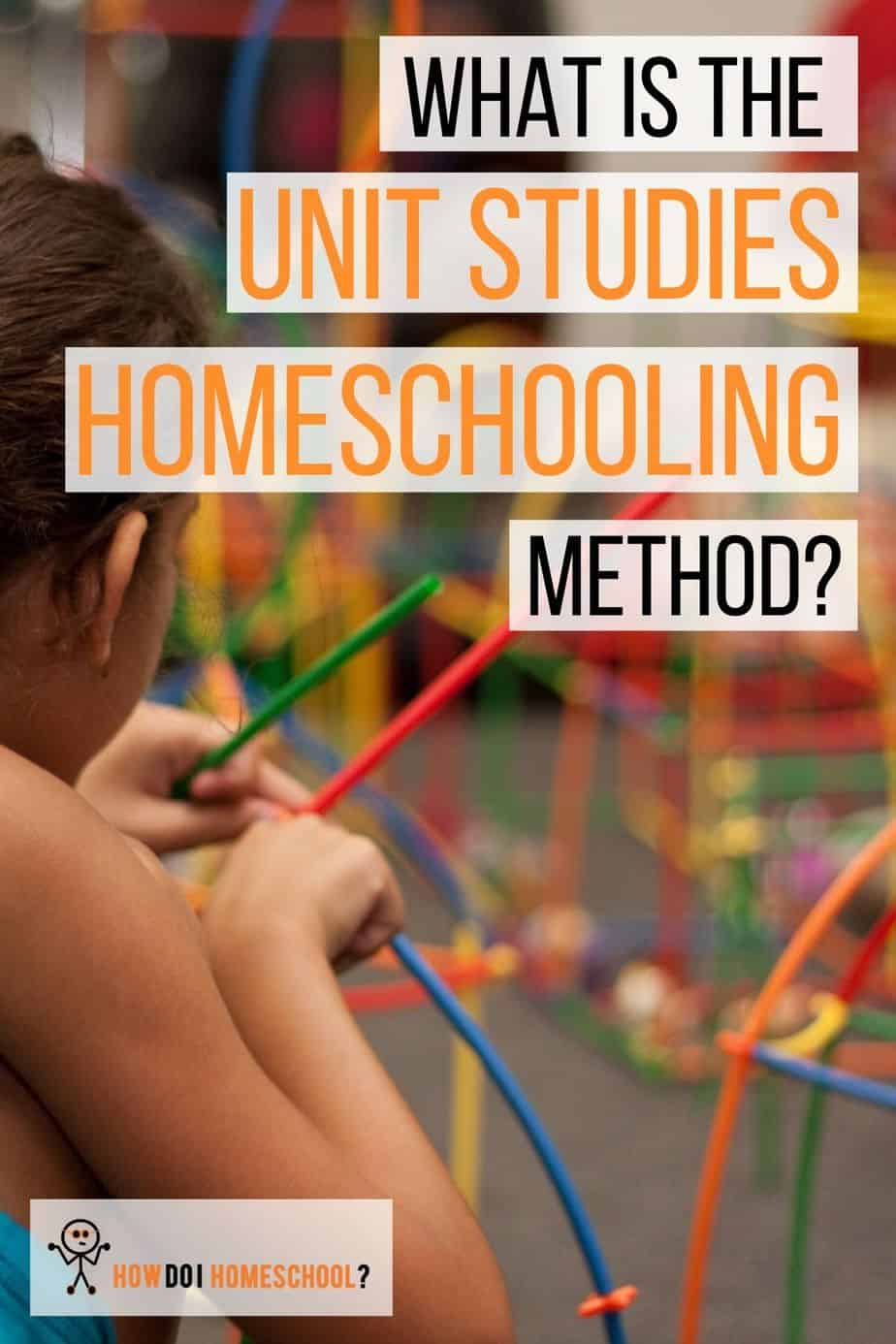
Unit Studies Homeschooling Curriculum
Several homeschool curricula follow the Unit Studies approach. Some follow it and are wholly accurate to the methodology. Others incorporate it with other homeschooling methods, giving you an eclectic curriculum. The most notable curriculum programs that use the US approach include:
- KONOS Unit Studies – A Christian homeschool program that allows you to teach all your children at once.
- Weaver by Alpha Omega Publishing (AOP) – AOP produces the Weaver US curriculum. Where possible, they include as many family members in the program as possible.
- Amanda Bennet Unit Studies – sells individual units and subjects.
- Moving Beyond the Page – a program that caters to all children, especially gifted learners. Children learn through creative, hands-on projects and literature in this secular curriculum.
- My Father’s World – a Christian homeschool curriculum that uses US, Classical, and Charlotte Mason methods. It sounds like an ill-assorted mix, but the program gets excellent reviews.
- Tapestry of Grace – Classical, Christian homeschooling choice.
- Hands of a Child – a lap-booking curriculum.
- Online Unit Studies – While not a complete homeschool curriculum, Techie Homeschool Mom offers a series of Online Unit Study options.
- Unit Studies Made Easy – this is a guide by the Bendt Family Ministries on creating your own Unit Studies curriculum at home.
These options let you choose something that matches your budget and your beliefs. It also allows you to mix and match a little if you want different programs from different curriculum providers.
Free US Options
You might want to use a more traditional homeschooling curriculum and include some US on the side. If so, there are several free resources, the best of which include:
- FreeUnitStudies.com – they offer around eight free courses.
- A Mothering – offers links to 100 free courses created by different bloggers.
- Faith and Good Works – this website has compiled 100 free homeschool unit study ideas.
If you purchase US Made Easy, you can create your own free US, which might be the right option, especially if you want to learn about a subject that isn’t mainstream.
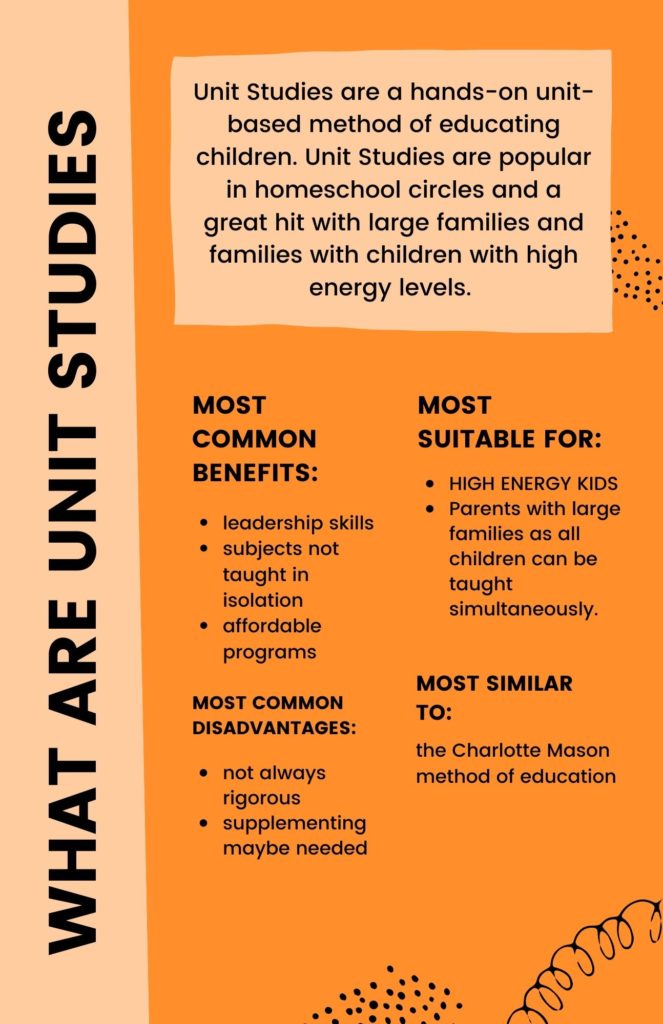
Conclusion
The homeschool unit studies method is an excellent option for large families. US can reduce stress in the homeschool by allowing mom and dad to direct studies for all children simultaneously. It lets older children teach younger siblings, developing leadership skills and a mastery of the subject. Because it is hands-on, children are particularly engaged and have fun with the subject. You can make your own curriculum easily or get free resources. If you’ve never considered US for your homeschool, why not try it now?
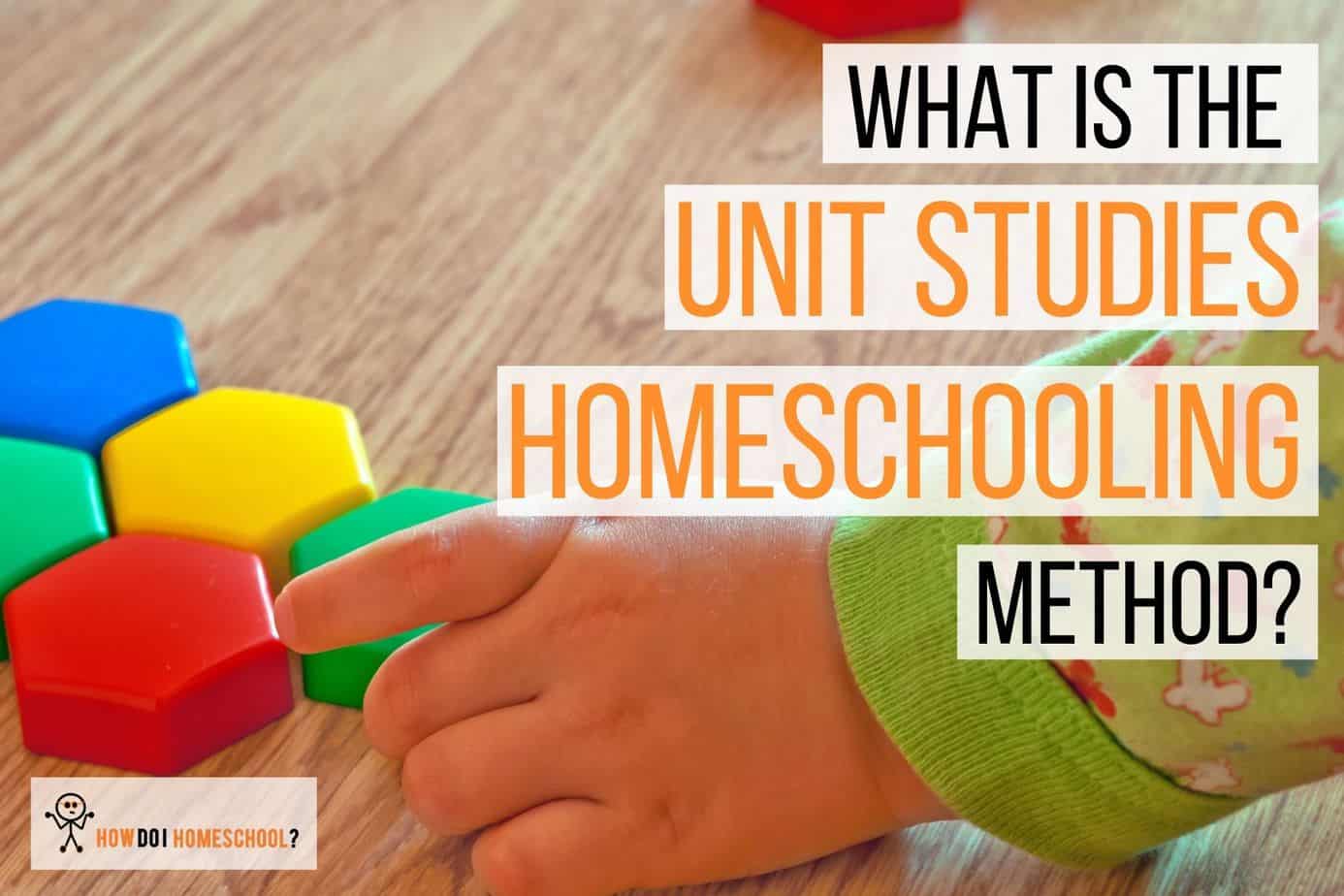
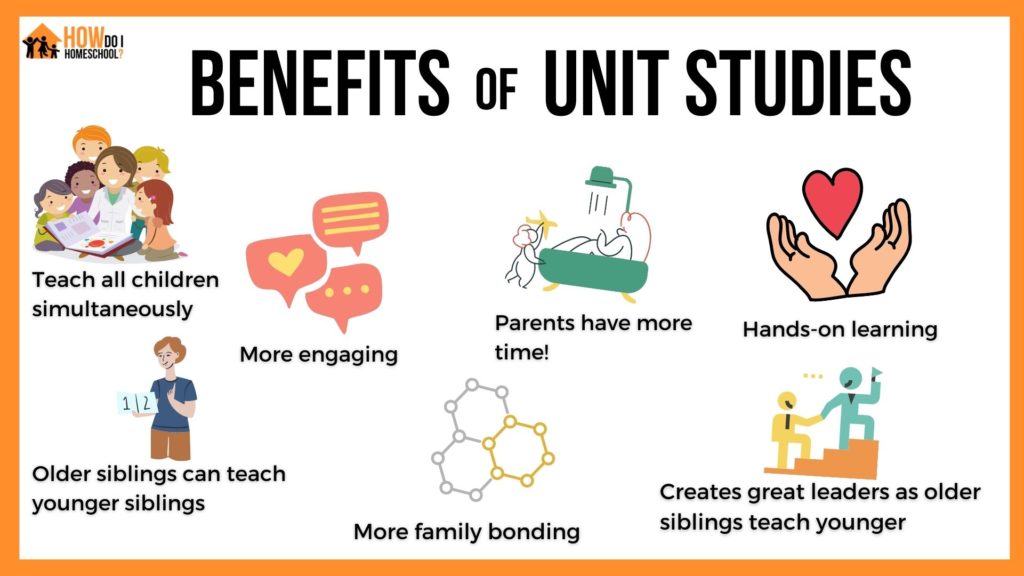


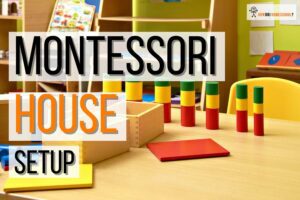
Hello,
I’m having trouble understanding how you would teach across multiple ages. For example, how would you teach the plagues of Egypt to say a 10 year old, 8 year old, and 6 year old at the same time? Thank you
I think you read the same text to all of them, but they have age-appropriate assignments they complete.